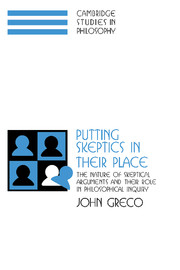 Putting Skeptics in their Place
Putting Skeptics in their Place Published online by Cambridge University Press: 03 November 2009
In this chapter, I consider two historically prominent skeptical arguments: one from Section XII of Hume's Enquiry concerning Human Understanding and the other from Meditation I of Descartes' Meditations on First Philosophy. My purpose is to reconstruct the arguments so as to put them in their most powerful form. But we should remember that by “powerful” I do not mean psychologically convincing. I do not think that either skeptical argument, even in its most powerful form, has the power to convince or persuade. Rather, the arguments can be reconstructed so that they are powerful in another sense: it is not at all easy to see where they go wrong, and rejecting them requires us to give up something that otherwise would seem plausible or perhaps even obvious. Such arguments are powerful heuristic devices in that they drive us to give up plausible but mistaken assumptions about knowledge and evidence, and inspire us to put something substantive in their place.
In the next chapter we will consider how several dismissive responses to skepticism fare against the reconstructed arguments. Remember that dismissive responses are ones that either (a) do not engage skeptical arguments at all or (b) engage them only superficially. Such responses are dismissive because they reject the skeptical conclusion without paying serious attention to the reasoning that leads up to it. Accordingly, dismissive responses miss the lessons that skeptical arguments can teach.
To save this book to your Kindle, first ensure [email protected] is added to your Approved Personal Document E-mail List under your Personal Document Settings on the Manage Your Content and Devices page of your Amazon account. Then enter the ‘name’ part of your Kindle email address below. Find out more about saving to your Kindle.
Note you can select to save to either the @free.kindle.com or @kindle.com variations. ‘@free.kindle.com’ emails are free but can only be saved to your device when it is connected to wi-fi. ‘@kindle.com’ emails can be delivered even when you are not connected to wi-fi, but note that service fees apply.
Find out more about the Kindle Personal Document Service.
To save content items to your account, please confirm that you agree to abide by our usage policies. If this is the first time you use this feature, you will be asked to authorise Cambridge Core to connect with your account. Find out more about saving content to Dropbox.
To save content items to your account, please confirm that you agree to abide by our usage policies. If this is the first time you use this feature, you will be asked to authorise Cambridge Core to connect with your account. Find out more about saving content to Google Drive.